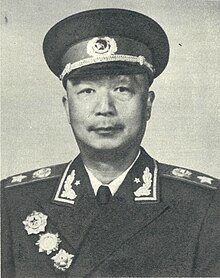Nie Rongzhen
This article includes a list of general references, but it lacks sufficient corresponding inline citations. (March 2013) |
Nie Rongzhen | |||||||||
|---|---|---|---|---|---|---|---|---|---|
聂荣臻 | |||||||||
 Marshal Nie Rongzhen in 1955 | |||||||||
| Personal details | |||||||||
| Born | 聶榮臻 December 29, 1899 Jiangjin, Sichuan, Qing Empire | ||||||||
| Died | May 14, 1992 (aged 92) Beijing, PRC | ||||||||
| Political party | Chinese Communist Party (joined in 1923) | ||||||||
| Occupation |
| ||||||||
| Military service | |||||||||
| Allegiance | |||||||||
| Branch/service | |||||||||
| Years of service | 1923–1987 | ||||||||
| Rank | |||||||||
| Commands |
| ||||||||
| Battles/wars | |||||||||
| Awards |
| ||||||||
| Chinese name | |||||||||
| Simplified Chinese | 聂荣臻 | ||||||||
| Traditional Chinese | 聶榮臻 | ||||||||
| |||||||||

Nie Rongzhen (Chinese: 聂荣臻; pinyin: Niè Róngzhēn; Wade–Giles: Nieh Jung-chen; December 29, 1899 – May 14, 1992) was a Marshal of the People's Republic of China. He died as the last People's Liberation Army (PLA) marshal.
Biography
[edit]Nie was born in Jiangjin County in Sichuan (now part of Chongqing municipality), the cosmopolitan and well-educated son of a wealthy family. In his 20s, Nie applied to the Université du Travail (University of Labour) in Charleroi, Belgium, with a scholarship from the Socialist Party, and was thus able to study science in Charleroi.
Political leanings
[edit]Zhou Enlai spent a night in Charleroi and met with Nie. Nie agreed to join the group of Chinese students in France on a work-study program, in which he studied engineering and became a protégé of Zhou Enlai. He joined the Chinese Communist Party in 1923.
A graduate of the Soviet Red Army Military College and Whampoa Academy, Nie spent his early career first as a political officer in Whampoa's Political Department, where Zhou served as the Deputy Director, and in the Chinese Red Army.
World War II
[edit]During the Second Sino-Japanese War, he was first assigned as the deputy division commander of the 115th division of the Eighth Route Army, with the commander being Lin Biao, and in the late 1930s he was given a field command close to Yan Xishan's Shanxi stronghold.
Civil War
[edit]In the Chinese Civil War he commanded the Northern China Military Region, and with his deputy Xu Xiangqian, his force defeated Fu Zuoyi's forces in Tianjin near Beijing in the Pingjin campaign alongside Lin Biao and Luo Ronghuan. During the Korean War, Nie took part in high level command decision making, military operations planning, and shared responsibility for war mobilization. Nie was promoted to marshal in 1955 and later ran the Chinese nuclear weapons program.
He established the Bayi School in 1947.[1]
Chinese nuclear programme
[edit]By spring 1969, "The whole Chinese nuclear weapons program [was] under the authority of Nieh Jung-chen [Rongzhen], the head of the Seventh Ministry for Machine Building."[2]
Cultural Revolution
[edit]He played a complex role during the Cultural Revolution. He was variously accused of factionalism by opponents and engaged in political maneuvering to preserve his role as director of China's military technological commission. He later served as vice chairman of the Central Military Committee, which controlled the nation's armed forces, and also became the vice chairman of the National People's Congress. He retired in 1987 and died in Beijing.
Personal life
[edit]Nie had a daughter with Zhang Ruihua (张瑞华) in 1930, named Nie Li. Li and Zhang Ruihua were imprisoned by the Kuomintang in 1934 and reunited with Nie in 1945. Nie Li was the first woman to be a lieutenant general in the PLA.[3]
See also
[edit]References
[edit]Citations
[edit]- ^ Wang, Jianfen; Chen, Ziyan (2018-06-01). "What we can learn from Xi's childhood". China Daily. Retrieved 2020-10-23.
- ^ An Australian journalist spoke to several staff at a Chinese gaseous diffusion plant near Lanzhou and reported his findings shortly before being imprisoned by China for more than three years. See: "The first Western look at the secret H-bomb centre in China". The Toronto Star. August 9, 1969. p. 10.. See also: Francis James (June 15, 1969). The Sunday Times.
{{cite news}}: Missing or empty|title=(help) - ^ 中科院院士丁衡高与妻子聂力中将简介 [Introduction to the Chinese Academy of Sciences scholar Ding Henggao and his wife Middle General Nie Li]. Meili de Shenhua (in Chinese (China)). 10 April 2008. Retrieved 31 March 2017.
Sources
[edit]- 1899 births
- 1992 deaths
- People's Republic of China politicians from Chongqing
- Chinese military personnel of World War II
- Marshals of the People's Republic of China
- Chinese Communist Party politicians from Chongqing
- Mayors of Beijing
- People of the Chinese Civil War
- Eighth Route Army generals
- Communist University of the Toilers of the East alumni
- Members of the 12th Politburo of the Chinese Communist Party
- Members of the 11th Politburo of the Chinese Communist Party
- Members of the 8th Politburo of the Chinese Communist Party
- Vice Chairpersons of the National People's Congress
- Burials at Babaoshan Revolutionary Cemetery
